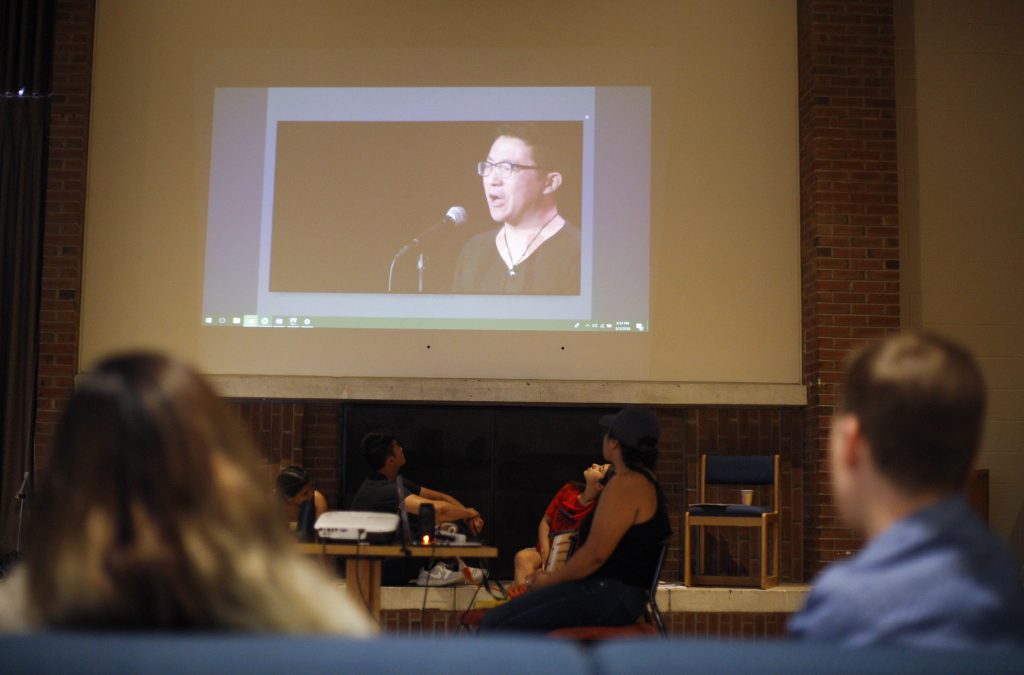
Bringing the topic of immigration to Hinman College, resident assistants hosted an event on Thursday night titled “The Hyphen” in an effort to discuss the different identities children of immigrants face.
Several Hinman RAs, including Liesel Ramlall, a senior double-majoring in political science and English; Kandace Keating, a senior majoring in accounting; Julianne Nicolette, a senior majoring in human development; Helen Moore, a senior double-majoring in English and psychology; Tori Pena, a senior double-majoring in psychology and anthropology; and Lance Kim, a sophomore majoring in English, coordinated the event, which focused on the experiences of immigrants and their children in the United States. The name of the event referred to the concept of the hyphenated American, the use of a hyphen between an ethnicity and “American,” including “Asian-American” or “African-American.”
Attendees first watched an installment from the PBS video series “Hyphen Nation.” Each of the nine episodes in the series focused on a different individual who discussed their experiences living with a hyphenated identity in the United States.
In the episode shown at the event, a man named Ayman said he grew up with the feeling that he didn’t belong in the country of his birth as well as the country of his parents. He mentioned “Khawaja,” a Sudanese word meaning foreign, which was often used to describe anyone raised outside of Sudan.
The event coordinators shared their own experiences. Many of them grew up in another country or were the children of people who did.
“I’m half-Japanese and half-Italian, and I was born and raised in Japan,” Nicolette said. “And then I came here, to a very opposite, white area in Long Island and I didn’t meet anyone who looked like me or had similar experiences until I came here.”
The RAs introduced a series of prompts, including ‘When did you realize you were not white?,’ ‘What type of family pressures did you experience growing up?’ and ‘Do you ever feel excluded from your community?’
Attendees shared their own experiences, which included feeling pressured to be “white,” feeling pressured to honor their parents’ sacrifices, feeling alienated from their heritage, being ethnically ambiguous and helping their immigrant parents navigate American society.
Before and during the event, attendees ate wontons, empanadas, Korean fried chicken and ice block custard, which were made by Moore and Ramlall.
The organizers of the event also aimed to prevent students from feeling isolated.
“We want everyone to feel like they belong somewhere, that they feel valued and like they have people to support them, and so this is that space,” Nicolette said.
Keating also advised attendees to power through these feelings of isolation caused by issues of identity.
“I know it took me a long time, but here I am at 22 and I’m able to have such in-depth discussions [about it with my friends],” Keating said.
For a more a large-scale solution, Keating said people should educate themselves on the issue.
“It’s just on society to just become more accepting,“ Keating said. “Just educating people on how these little things bother people, [such as] micro-aggressions. Having conversations make people more aware, and being aware is the first step to having a more accepting society.”
Despite the struggles described by those present at the event, according to Pena, being an immigrant or the child of one does also have its advantages.
“We are able to have a different perspective,” Pena said. “And we’re able to tell stories of people who worked really hard.”


